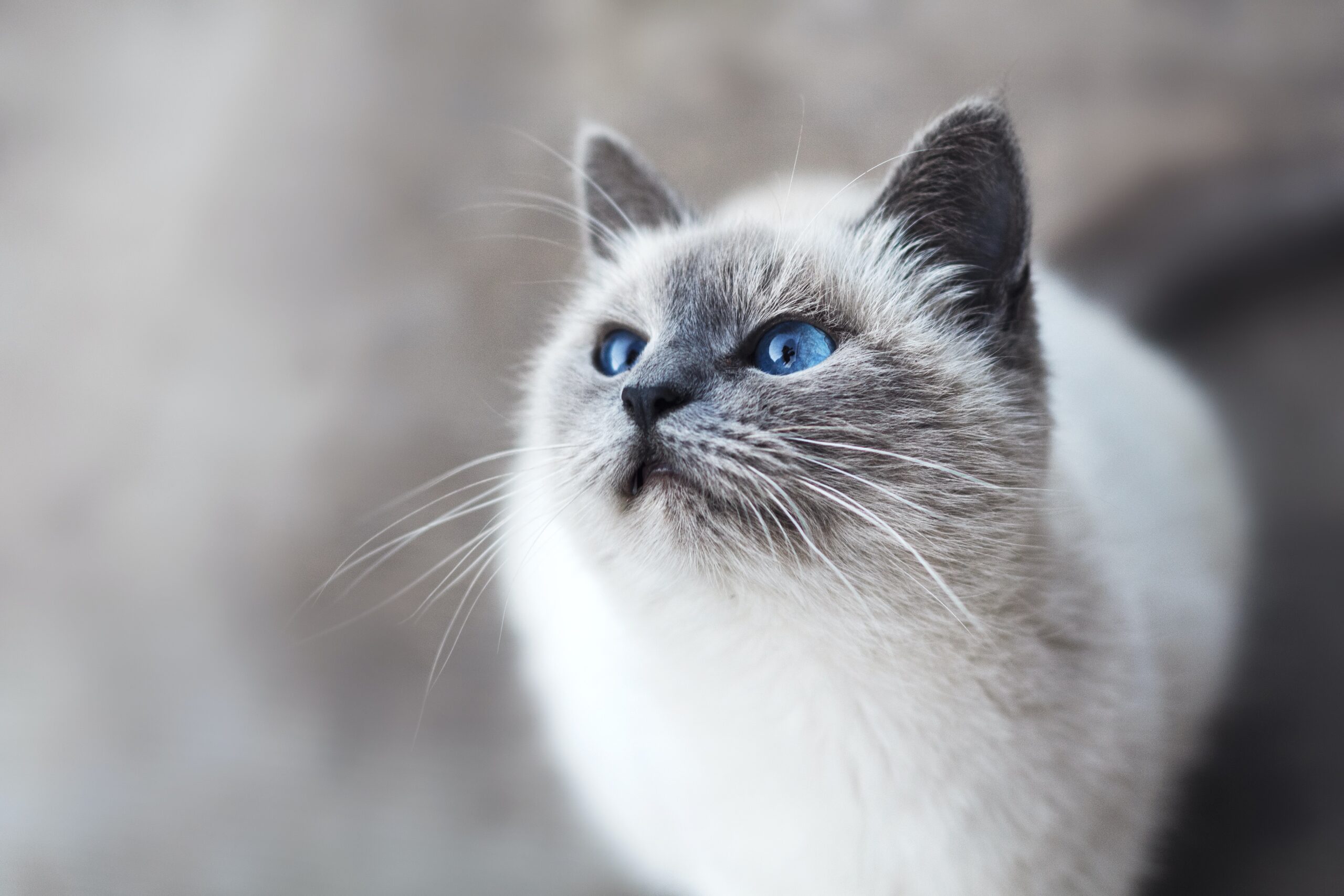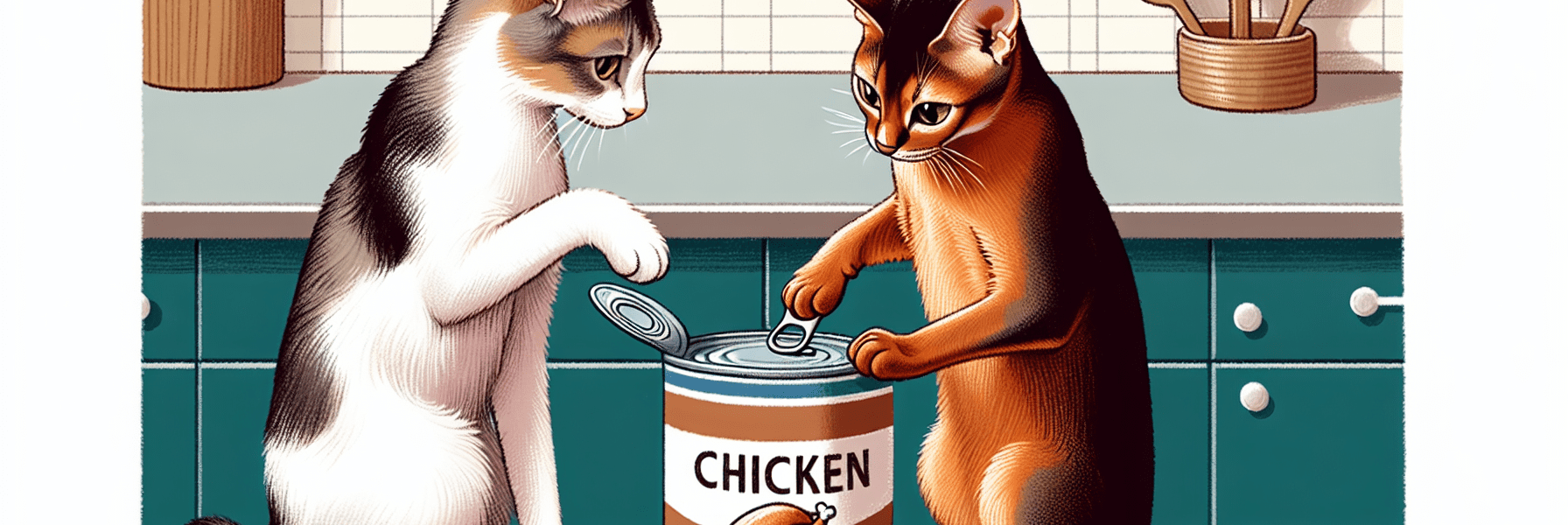If you’ve ever wondered if cats can indulge in the deliciousness of canned chicken, you’re not alone. It’s a common curiosity among cat owners to know if this human food can be safely consumed by their feline companions. While cats are obligate carnivores and primarily thrive on a diet of meat, it’s important to explore whether canned chicken meets their nutritional needs and is suitable for their delicate digestive systems. In this article, we’ll delve into the topic of cats and canned chicken, discussing the potential benefits and risks involved, so you can make an informed decision about treating your furry friend to this tempting treat.

This image is property of images.unsplash.com.
Can Cats Eat Canned Chicken
If you’re a cat owner, you may have wondered whether it’s safe to share your canned chicken with your furry friend. After all, canned chicken is a convenient and affordable option for humans, so it’s natural to wonder if it can provide similar benefits for your cat. In this article, we will explore the topic of cats eating canned chicken in detail. We’ll discuss what canned chicken is, its nutritional value, as well as the health benefits and potential risks associated with feeding it to your feline companion. We’ll also provide alternative options to canned chicken that you can consider for your cat’s diet.
What is Canned Chicken
Canned chicken is a type of convenience food that has gained popularity among humans due to its versatility and long shelf life. It typically consists of chicken meat that has been cooked, deboned, and packed in water or broth before being sealed in a can. Canned chicken can be an excellent source of protein, making it a staple in many kitchens. But is it safe and suitable for cats?
Definition
The definition of canned chicken is straightforward – it refers to chicken meat that has undergone a canning process. The chicken can either be cooked, seasoned, or without any added flavorings. It is important to check the label for additives or other ingredients that may be harmful to cats.
Processing Methods
Canned chicken goes through a process that involves cooking the chicken meat, removing the bones, and packing it in a can with added liquids to preserve the taste and texture. The cooking process kills bacteria, making the chicken safe to consume. However, it is essential to note that the extent of processing may vary between different brands and products.
Variants of Canned Chicken
While plain canned chicken is the most common variant, there are also flavored options available, such as canned chicken in broth or with added seasonings. It is important to choose the plain, unseasoned variant when considering feeding canned chicken to your cat. Flavored options may contain ingredients that are harmful or unsuitable for feline consumption.
Nutritional Value of Canned Chicken
When it comes to the nutritional value of canned chicken, it offers several important nutrients that are beneficial for both humans and cats alike. Let’s take a closer look at these nutritional components.
Protein Content
Protein is crucial for a cat’s health as it supports various bodily functions, including muscle development, skin and coat health, and the immune system. Canned chicken is a rich source of protein, making it a good option to include in your cat’s diet. High-quality protein can provide the essential amino acids that cats cannot produce on their own.
Fat Content
Cats require a certain amount of fat in their diet to provide energy and support nutrient absorption. Canned chicken can be a moderate source of fat, depending on the specific product. It is important to select varieties that are not overly high in fat to avoid potential health concerns such as obesity or gastrointestinal issues.
Vitamins and Minerals
Canned chicken can also provide your cat with essential vitamins and minerals. These include vitamin B12, vitamin D, iron, and zinc, which are beneficial for various bodily functions. However, it’s worthwhile to note that the nutrient content can vary between different brands and products. Checking the label for specific nutrients can help ensure that your cat is getting a well-rounded diet.
Caloric Density
The caloric density of canned chicken can also be a factor to consider when incorporating it into your cat’s diet. While cats require a calorie-dense diet, it is essential to balance their caloric intake to prevent weight gain or loss. Monitoring portion sizes and consulting with your veterinarian can help ensure that your cat is receiving the appropriate amount of calories from canned chicken.
Health Benefits of Canned Chicken for Cats
Feeding your cat canned chicken in moderation can provide several health benefits. Here are some of the reasons why canned chicken can be a beneficial addition to your cat’s diet.
Protein Source
Canned chicken can serve as a valuable protein source for your cat. Protein is essential for maintaining and repairing body tissues, supporting healthy growth and development, and providing energy. Including canned chicken in your cat’s diet can help ensure that they receive an adequate amount of protein.
Skin and Coat Health
One of the most noticeable benefits of feeding your cat canned chicken is the effect it can have on their skin and coat. The protein and healthy fats present in canned chicken can contribute to a shiny, lustrous coat and reduce the likelihood of skin problems.
Muscle Development
Protein is crucial for muscle development, and canned chicken can provide a good amount of high-quality protein to support your cat’s muscle growth. Whether your cat is a growing kitten or an adult maintaining their muscle mass, incorporating canned chicken into their diet can assist in achieving optimal muscle health.
Amino Acids
Amino acids are the building blocks of proteins and are essential for various biological processes. Canned chicken contains essential amino acids that cats cannot produce on their own, making it a valuable addition to their diet. Amino acids play a role in functions such as enzyme production, hormone synthesis, and immune system support.
Immune System Support
Feeding your cat canned chicken can also contribute to their immune system health. The vitamins and minerals present in canned chicken, along with its protein content, can support a strong immune system, helping your cat stay healthy and resilient against diseases or infections.

This image is property of images.unsplash.com.
Risks and Concerns
While canned chicken can offer several benefits, there are also potential risks and concerns that you should be aware of before introducing it into your cat’s diet.
Sodium Content
Canned foods, including canned chicken, often contain added salt or sodium for flavoring and preservation purposes. Excessive sodium intake can lead to health issues such as high blood pressure or kidney problems. When choosing canned chicken for your cat, opt for low-sodium or no-added-salt varieties to minimize the risk of sodium-related complications.
Additives and Preservatives
Some canned chicken products may contain additives or preservatives that can be harmful to cats. Ingredients such as onion or garlic, which are commonly found in human food, can be toxic to cats. Always check the product labels for any additives or preservatives that may be harmful to your cat’s health.
Allergy Risks
Like humans, cats can have allergies or sensitivities to certain foods. While canned chicken is generally well-tolerated by cats, there is still a possibility of an allergic reaction. If you notice any signs of an allergic reaction, such as vomiting, diarrhea, or itching, discontinue feeding your cat canned chicken and consult with your veterinarian.
Quality and Sourcing
The quality and sourcing of canned chicken are important factors to consider when selecting a product for your cat. Opt for reputable brands that prioritize high-quality ingredients and ethical sourcing practices. Ensure that the chicken used in the product is free from antibiotics and hormones to promote the overall health and well-being of your cat.
Digestive Issues
Introducing canned chicken into your cat’s diet too quickly or in excessive amounts can potentially lead to digestive issues such as diarrhea or vomiting. It’s important to gradually incorporate canned chicken into your cat’s diet and monitor their digestion. If any issues arise, adjust the portion size or speak with your veterinarian for guidance.
Feeding Canned Chicken to Cats
If you decide to feed canned chicken to your cat, it’s essential to follow some guidelines to ensure their health and well-being.
Portion Control
Portion control is crucial when feeding canned chicken to your cat. While it can provide valuable nutrients, it should not make up the entirety of your cat’s diet. Aim to incorporate canned chicken as a treat or a small portion of their overall meals. Consulting with your veterinarian can help determine the appropriate portion size for your cat based on their individual needs.
Incorporating into Diet
Canned chicken should be incorporated into your cat’s existing diet rather than being their sole source of nutrition. Combine it with high-quality commercial cat food that is specifically formulated to meet their nutritional needs. This variety in their diet ensures that they receive a balance of different nutrients.
Feeding Guidelines
When it comes to feeding canned chicken to your cat, there are a few guidelines to keep in mind. Firstly, always check the product for any harmful additives or preservatives. Opt for plain, unseasoned varieties to minimize the risk of adverse reactions. Additionally, avoid feeding your cat chicken bones as they can splinter and pose a choking hazard.
Monitor Digestion
As with any dietary change, monitoring your cat’s digestion is essential when introducing canned chicken. Gradually incorporate it into their diet and observe how their body reacts to the new food. If you notice any signs of digestive problems such as diarrhea or vomiting, adjust the portion size or consult with your veterinarian for further guidance.
Consulting with Vet
Lastly, it is always recommended to consult with your veterinarian before making any significant changes to your cat’s diet. They can provide tailored advice based on your cat’s specific needs, taking into account their age, weight, health condition, and any existing dietary restrictions.

This image is property of images.unsplash.com.
Alternatives to Canned Chicken for Cats
If you’re unsure about feeding your cat canned chicken or if you’re looking for alternative options, there are several other protein sources you can consider.
Raw Chicken
Raw chicken can be a suitable alternative to canned chicken, as it offers similar nutritional benefits. However, it’s important to note that feeding raw chicken comes with its own set of risks, such as bacterial contamination. Consult with your veterinarian and follow proper food safety guidelines if you choose to feed raw chicken to your cat.
Cooked Chicken
Cooked chicken, without any seasonings or additives, can also be a viable option for cats. Ensure that the chicken is thoroughly cooked to eliminate any potential bacteria. However, remember that cooked chicken may lose some of its nutritional value during the cooking process, so it’s necessary to provide additional sources of essential nutrients.
Commercial Cat Food
High-quality commercial cat food is specifically formulated to meet the nutritional needs of cats. These diets are designed to provide a balanced combination of proteins, fats, vitamins, and minerals necessary for your cat’s health. When choosing commercial cat food, opt for reputable brands that prioritize high-quality ingredients and follow nutritional guidelines.
Other Protein Sources
In addition to chicken, there are various other protein sources that you can include in your cat’s diet. Some options include turkey, fish, beef, or even plant-based proteins for cats with specific dietary requirements. It’s important to maintain a balanced diet that provides all the essential nutrients your cat needs.
In conclusion, while canned chicken can be a safe and beneficial addition to your cat’s diet, it’s crucial to understand the potential risks and follow proper feeding guidelines. Considering alternative protein sources and consulting with your veterinarian can help ensure that your cat receives a well-rounded and nutritious diet. Remember, a cat’s health should always be your priority, and it’s best to make informed decisions about their dietary choices.

